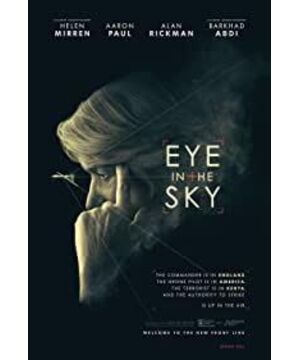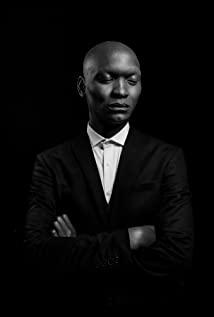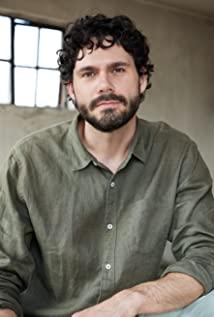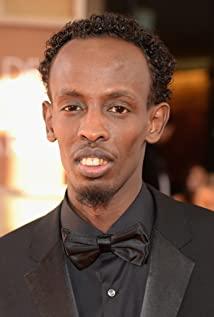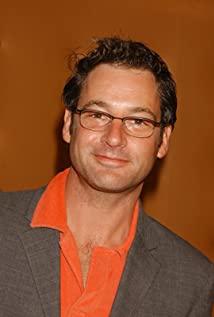This article was first published on "Ruiying vanguard public account"
Telling a story about counter-terrorism in 102 minutes, "Eye in the Sky" is special in that it subtly shows the problem, rather than trying to solve it, because the attitude of solving a problem is often extreme, and showing a problem Courage is commendable.
From the little girl in the film to set up a stall to buy bread as a boundary, the film actually tells about two problems. The first half is to show the multi-faceted wrestling of politicians and soldiers in an anti-terrorism campaign; the second half is to try to propose a "tram problem"—— Whether the value of life can be measured by quantity.
This kind of group portrait display of real-time emergencies is a highlight of this film, because although it is also a counter-terrorism film, the Korean film "Terror Live" is famous for its excellent acting skills and ups and downs, but In the rotating display of decision-making bodies, it is obviously not more complicated than "Eye in the Sky".
This film places a military decision on counter-terrorism in legal, diplomatic, humanitarian, political, etc. Testing in multiple dimensions is not so much a propaganda of Western "humanitarianism" and "democratic decision-making", but an ironic expression of the Western bureaucracy's "shuffling" responsibility.
But the focus that attracts the most attention should actually be the second half, which is to install the paradigm of the "trolley problem" into the battlefield of anti-terrorist operations, so that the off-screen audience can feel the same moral dilemma as the movie characters.
In fact, the so-called moral dilemma can only be used to show, but cannot be solved. This is based on the measurement of life scale: Is the majority of life higher than the minority? Is the older life necessarily higher than the younger life? And this scale is precisely unmeasurable.
The reason why this issue is so prominent in the West that it can even be discussed on the movie screen is not unrelated to the emphasis on “individualism” in the West, because in a collectivist society, the majority naturally trumps the minority, and so is life.
The Western cultural background under "individualism" endows this film with a kind of tragic indictment. The film does not intend to cater to the emotional catharsis of "individualistic" viewers in the movie, but uses a "helpless" tragedy The ending comes to lick the insignificance of the individual in front of the collective.
At the beginning of the film, the famous saying of Aeschylus, the "father of tragedy" in ancient Greece: "In war, the first to fall is the truth". In fact, it not only makes the film more compelling, but also has an allegorical nature. To deal with this theme, after all, individual life is so vivid and in plain sight, but no one can refuse to choose to sacrifice the current little girl in order to save more unknown lives.
And the reason why the audience can feel the "chills" after watching the whole film, let alone a video technique - group gaze.
"Group gaze" often allows a certain character or an event to be displayed in the eyes of everyone, and through multiple angles of inspection and interpretation, it shows the diversity of perspectives and the multi-faceted human nature. "Eye in the Sky" is to put the little girl under the "eye of the sky", and all agencies are using the "identity" level or "humanity" level to express opinions on her fate. This kind of God-style decision-making perspective is the essence of this film. So the reason for having the "tragic" shell.
A more favorable way to deal with it is to add such a tragic factor, so the little girl portrayed in the film is an image who wants to pursue freedom, happiness, filial piety, and is innocent and lovely. When such an image appears in the eyes of various forces, it will cause It is not only the humanitarian sympathy and plight of the politicians and soldiers in the film, but also the plight of the viewers in making humanitarian decisions.
So from a certain perspective, this film is not just a simple military anti-terrorism theme film, "military" is the form, and "morality" is the core. Whether it is the lashing of hypocrisy in South Korea's "The Furnace" or the unconscious exclusion of the sacrificial crowd in the Danish film "The Hunt", the topic of morality will never disappear from the screen, but it needs new forms to inject fresh blood.
The handling of images in "Eye in the Sky" is ingenious in the setting of the characters. It links the lovable little girl with death, and also links the decision-making of death with politicians and soldiers. The high-level irony is nothing but the same; The cleverness of the story is that it does not blindly support "save one and lose a hundred", but uses the result of "save a hundred and lose one" to describe the sense of moral powerlessness.
In terms of layout, it is not grand, and in terms of depth, it is also incapable of chanting scriptures. This film just touches the nerves of the audience, letting us know that as a human being, we can still be bloody.
View more about Eye in the Sky reviews


